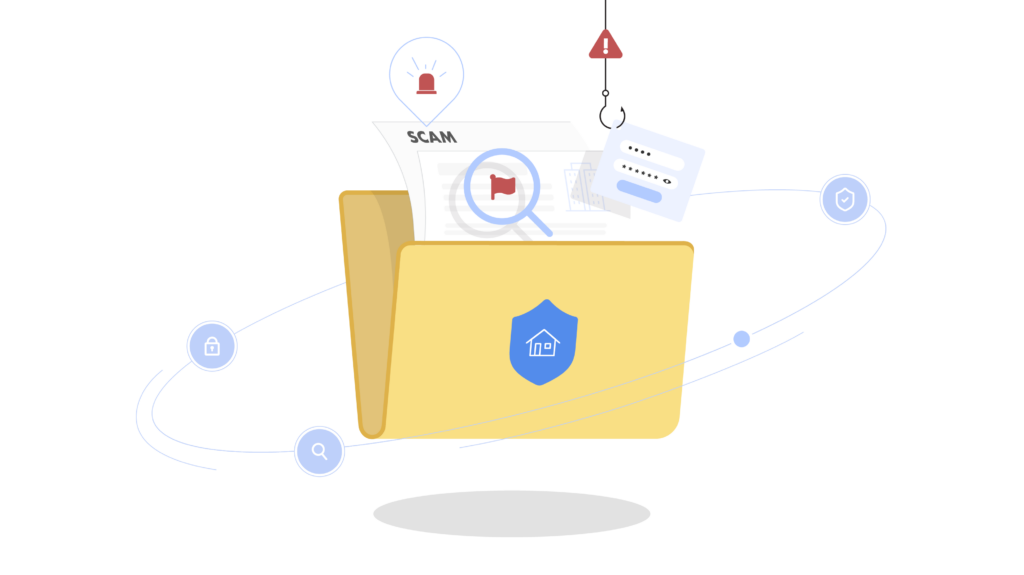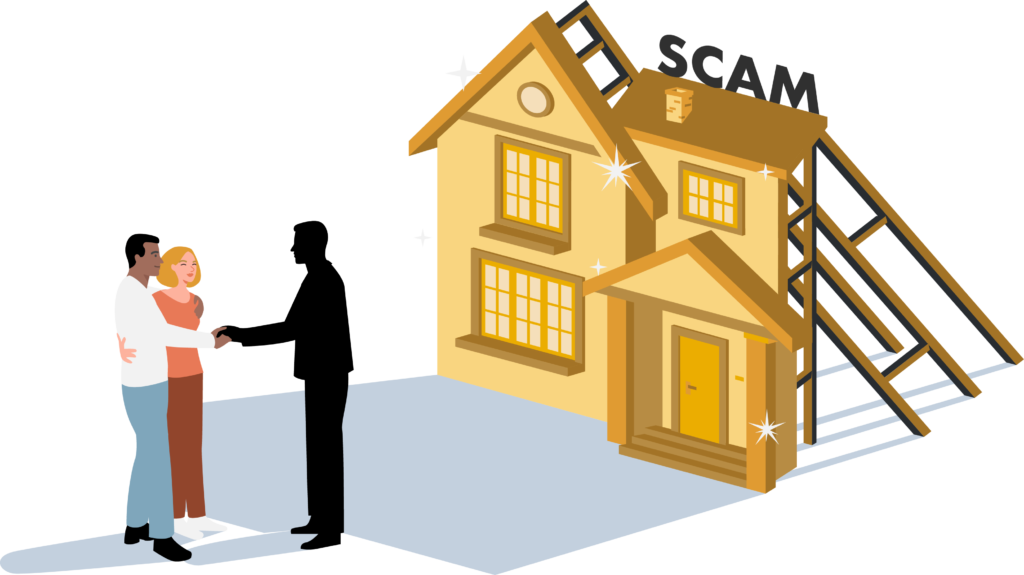Everything you need to know about rental scams
Learn the warning signs of rental scams and equip yourself with the right tools to prevent them. This comprehensive resource hub will offer a detailed breakdown on types of rental scams, stories from other renters, and tips on how to report fake listings.

Resource Hub: How to avoid rental scams?
What are common signs of rental scams?
At different stages of the rental process, there are certain “red flags” you should be aware of as a renter.
- Browse & view listings
- Apply for listing
- Sign & pay deposits
- Suspicious photos
- No address details
- Inconsistent pricing
>> For the full list, visit "How to protect yourself from rental scams"
- Informal / no screening process
- Too much information required
- Difficulty arranging a viewing
>> For the full list, visit "How to protect yourself from rental scams"
- Request illegal deposits
- Don't use standard lease agreement
- Refuse to use traceable payment methods
>> For the full list, visit "How to protect yourself from rental scams"

What are the types of rental scams you should know?
As technology advances, rental scams have also evolved. Find out what the most common types of rental scams are in Canada.
Rental scams on Facebook Marketplace
Learn to recognize the latest rental scams on Facebook, Facebook Groups, and Facebook Marketplace.

Facebook scam
“My friend got scammed on fb. The person who posted asked for reservation fee in a shared room apartment. Then got blocked and ghosted. Be careful when sending money! Everything should be on writing so you have record.”
Anonymous
Renter | Vancouver, BC
Rental scams on Craigslist
See the most common rental scams on Craigslist and other popular marketplace sites.

Craigslist scam
“A home in my area was listed on Craigslist for rent. Besides text messages, the landlord never responded to my phone calls. After signing a rental agreement, I requested to view the property before sending money. But the landlord demanded the money first, so I didn't end up renting the place.”
Anonymous
Renter | Toronto, ON
Payment fraud scams
Learn how to recognize and prevent rental scams targeting your hard-earned money.

Payment fraud scam
"I've encountered a few scams, for listings at too good of a price - often properties that just got listed for sale. They claim they're not in town, will send a relative to show you the space and say you must sign the lease immediately. Once you agree, they ask for the first month's rent by e-transfer and go on to say that you can cancel the e-transfer if you don't want the place.”
Anonymous
Renter | Vancouver, BC
Identity theft scams
Learn how to recognize and prevent rental scams targeting your personal information.

Identity theft scam
"My sister was desperate to find a place and ignored the telltale signs of rental scams: too good to be true pricing, unable to view property, poorly constructed emails, non-Canadian number. She ended up giving copies of her ID and SIN, so I had her to freeze her credit and report the fraud.”
Anonymous
Renter | Montreal, QC
The latest rental scams in Canada
Stay up-to-date on the latest rental scams in Canada.
American couple falls victim to Revelstoke rental scam
An american couple fell victim to a rental scam in Revelstoke, BC. After making a post on the Revy Rentals Facebook page, they were contacted by a landlord offering a 1-bed & den for $1700. They went through the entire rental process including the submission of personal info and deposit. The landlord even went as far as performing a background check through a supposed lawyer. The couple didn't realize until they showed up to the property that it was a scam.
Rental scam warning from St. John's homeowner
A woman, who lives near Memorial University in St. John's, finds that her address has been used by scammers dozens of time. Over the past three years, she estimates that 35-40 people came to view her property only to realize that it was a scam. It was barely noticeable at first, but these visits started picking up last year - becoming a weekly cadence. A young man who fell victim to this scam told her that he saw an ad posted to a student housing group on Facebook.
Facebook rental scam targets North York renters
A man has been arrested by Toronto police in connection to a rental scam on Facebook that targeted renters in North York. Under the name "Diamond Dallas Taylor", the suspect advertised a room for rent at 1818 Weston Road on Facebook Marketplace and posed as the unit's owner during showings. After potential tenants paid the $800 deposit to secure the room, he would cut off contact. Police believe that there may be additional victims and urge them to come forward.
How to spot a fake listing or landlord?
- How to spot a fake landlord?
- How to verify a landlord is legit?
- What questions should I ask landlords?
- What information can I request from landlords?
- What tools can I use to tell if a landlord is legit?
To spot a fake landlord, be sure to keep an eye out for common red flags like informality, refusal to meet in-person, or urgent demands for cash deposits.
>> For more red flags, refer to our blog "How to protect yourself from rental scams"
The best way to tell if a landlord is legitimate is by using a rental platform with built-in verification features, or by searching for land title records using your local registry. Viewing the rental property in-person is also a good way to verify ownership, but isn’t an exhaustive strategy since there are more occurences of scammers posing as owners of a property during a viewing.
>> Take a look at how liv.rent verifies landlords on its platform
It's important for renters to ask questions about landlords’ rental experience, past tenants, the property itself, deposits, and any lease terms they’re unsure about.
>> For a complete list of questions, refer to our blog "56 questions renters should ask landlords before signing a lease"
Renters are within their rights to ask landlords for the following:
- Verify their name and contact info
- Provide a signed copy of the lease
- Clarify any maintenance and upkeep responsibilities
At liv.rent, we also request information from landlords. To verify their identity and property ownership, we request things like government-issued ID, business license, and land title documents.
Renters can protect themselves by utilizing a rental platform with multi-layered verification processes, such as liv.rent. By manually confirming landlords’ identity and matching their name to property records, tenants can rent with peace of mind. Alternatively, renters can also verify landlords’ identities on their own by performing a search of their local land title registry.
- How to check if a rental property is legit?
- How to check if a landlord owns a property?
- Can you ask landlord for proof of ownership?
- What are common signs of a suspicious listing?
- What tools can I use to tell if a listing is legit?
If you’re not using a platform with verified listings, it’s vital to keep an eye out for red flags such as blurry listing photos or hidden address details. As an extra step, search land title/property records to be 100% sure you’re dealing with a real property and the person who owns it.
To make sure a landlord owns a property, consider using a rental platform with built-in verification features, or by searching for land title records using your local registry. Viewing the rental property in-person is also a good way to verify ownership. However, there has been an increase in scammers posing as owners of a property during a viewing.
Yes, it is within your rights as a renter to ask a landlord for proof of ownership or management authorization. You can request documents such as property deeds, property tax records, or a letter from the property owner or authorized property management company. Verifying the landlord's ownership or management rights can help ensure the legitimacy of the rental arrangement and protect you from potential scams.
At liv.rent, we request landlords to verify their property by either submitting an official document (e.g. land title document) or entering a code sent through postcard.
The most common signs of a fake listing are blurry photos, hard-to-find address details, urgent demands for cash deposits, and reluctance to show the property in-person or virtually.
>> For more red flags, refer to our blog "How to protect yourself from rental scams"
Renters can tell if a listing is legit by utilizing a rental platform with multi-layered verification processes, such as liv.rent. By manually confirming landlords’ identity and matching their name to property records, tenants can rent with peace of mind. Alternatively, renters can also verify landlords’ identities on their own by performing a search of their local land title registry.
How to report a rental scam?

Flag the listing
Flag the the listing within the platform immediately so they can remove the listing and flag the person who placed the ad.

Freeze transaction
Freeze any financial transactions you may have put in motion. Contact your bank to explain the situation and follow their procedures.

Inform authorities
If you've been the victim of a rental scam or another type of fraud, report it to the Canadian Anti-Fraud Centre (CAFC) at 1-888-495-8501.

Educate yourself
The most important thing is to educate yourself to avoid being a victim of rental scams. Know your rights as a tenant.
If the scammer has your address and is sending someone to your home to pick up money, or if you feel your immediate safety is threatened, you can call 911 to report a fraud in progress.
If you are not experiencing immediate danger but did lose money, you can contact your local RCMP detachment to report the incident.
If you did not lose money, then contact the Canadian Anti-Fraud Centre (CAFC) at 1-888-495-8501 or online.
You can also seek guidance from your provincial government or regulatory body.
-
- Ontario: Ontario.ca – Report a scam or fraud
- BC: gov.bc.ca – Scams and fraud
- Alberta: alberta.ca – Fraud prevention
- Manitoba: gov.mb.ca – Fraud and scams
- Saskatchewan: saskatchewan.ca – Common frauds and scams
If you’re in BC, you can seek advice from the Tenant Resource and Advisory Centre or call their Tenant Infoline at 604-255-0546 or 1-800-665-1185.
It’s important to know your rights as a tenant for each stage of the rental process.
For more information, you can visit our blog on “Rental Laws in Canada“.
The best way to protect yourself from rental scams in Canada is to understand the ins and outs of a standard Residential Tenancy Agreement.
Find out what a standard lease agreement should include and what to pay attention to by refering to your province below:
Which sites can I trust to find my rental home?
Yes, liv.rent is legit and it is well-known as Canada’s safest rental platform thanks to strict, multi-layered measures taken to protect user information and data — including storing information with military-grade encryption protocols, and deleting vital information and documents as soon as it’s no longer necessary for the stated purpose. liv.rent has also pioneered detailed landlord & listing verification processes to ensure peace of mind at every stage of the rental process.
There are a few key things renters should look for when choosing a safe rental site: data encryption, verified landlords & listings, fraud detection & prevention, secure communication, clear privacy policy, and secure payments & contracts. For a list of Canada’s most secure rental platforms, click the button to learn more.
Yes, Rentals.ca is a legitimate website for rental listings in Canada.
Yes, Rentboard.ca is a legitimate website for rental listings in Canada.
Yes, Zumper is a legitimate platform for rental listings that is based in the United States and available in Canada.
Yes, Zillow is a legitimate rental platform.
Kijiji is a legitimate marketplace website that also facilitates rental listings. Renters are advised to use caution when applying for listings on sites like Kijiji and Craigslist due to the lack of verification measures on these platforms.
Yes, Padmapper is a legitimate platform that aggregates rental listings from various sources in multiple countries.
Yes, RentSeeker is a legitimate platform for rental listings in Canada.
Yes, Condos.ca is a legitimate website primarily used for condominium listings in Canada.
Yes, Realtor.ca is a legitimate platform operated by the Canadian Real Estate Association (CREA) for real estate and rental listings in Canada.
Yes, Rentfaster.ca is a legitimate platform for rental listings in Canada.
Rental scams FAQ
To avoid rental scams, keep an eye out for red flags like suspiciously low prices, blurry photos, and hidden address details, and always make an effort to verify the landlord’s ownership, either by using a platform with verified listings, or by consulting your local land title registry.
The best ways to protect yourself from rental scams in Canada is by educating yourself on common warning signs, verifying the landlord’s ownership, and using trusted rental websites – ideally platforms with verification practices in place.
E-transfers are typically traceable in the sense that there is a clear record of the transaction. You can usually access this information from your mobile banking app, a statement, or by calling your financial institution.
Red flags when renting a home on Craigslist include extremely low prices, requests for upfront payment without proper documentation, and landlords who are unable or unwilling to meet in person. Do keep in mind that some scammers may pose as owners of a property during a viewing.
Yes, landlords can ask for a photo ID to verify your identity as part of the rental application process, however in most provinces they aren’t permitted to retain a copy of these documents.
You can spot rental scammers by watching out for informality and urgency in communications, requests for personal financial information, and properties listed well below market value.
Renters shouldn’t attempt to catch a rental scammer on their own, but rather should alert the authorities using the channels listed above, as well as reporting the listing and/or user on the rental platform.
To verify landlord ownership in Canada, you can request proof of property ownership such as property deeds or land registry documents from the landlord. Platforms such as liv.rent can take care of this process for you to make browsing listings safe & easy.
To verify landlord ownership in Ontario, you can check the property’s ownership details on the Ontario Land Registry or request proof of ownership from the landlord.
Rent-to-own arrangements in Canada can be legitimate, but it’s important to thoroughly research and understand the terms and conditions before entering into such agreements.
A landlord may ask for a deposit before signing a lease, but they may not require it. It’s generally recommended to sign the lease agreement first to establish clear terms and protect both parties.
To spot a fake lease agreement, look for inconsistencies such as missing information, or requests for unusual clauses that seem unreasonable or unfair. Using standard provincial leases is the safest method, and it’s advised that tenants be cautious when landlords create their own terms.
Free Rent Ads is a classified advertising platform that allows users to post rental ads. While it can be a legitimate platform, exercise caution and do your due diligence when dealing with individual listings.
Connect with us
Got feedback? Contact us at media@liv.rent if you want to share your own rental scam story or would like to request specific resources. Also, make sure to subscribe to our newsletter for exclusive renter tips, strategies, and case studies.
